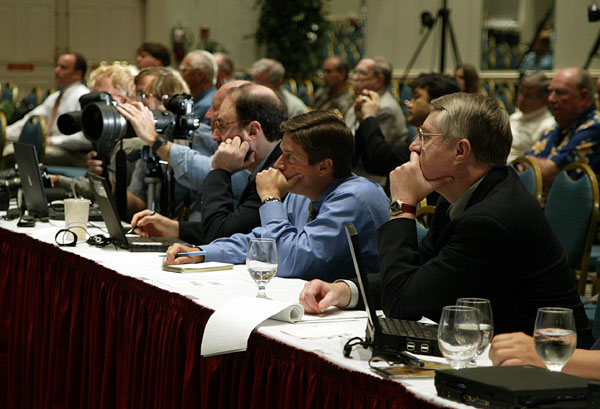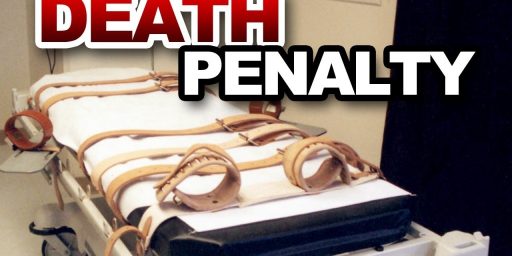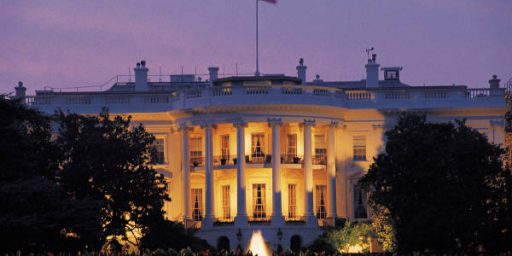Michigan Legislator Proposes Law To License Journalists
A Michigan legislator has introduced a bill that would authorize the state to issue licenses to journalists:
Senator Bruce Patterson is introducing legislation that will regulate reporters much like the state does with hairdressers, auto mechanics and plumbers. Patterson, who also practices constitutional law, says that the general public is being overwhelmed by an increasing number of media outlets–traditional, online and citizen generated–and an even greater amount misinformation.
“Legitimate media sources are critically important to our government,” he said.
He told FoxNews.com that some reporters covering state politics don’t know what they’re talking about and they’re working for publications he’s never heard of, so he wants to install a process that’ll help him and the general public figure out which reporters to trust.
“We have to be able to get good information,” he said. “We have to be able to rely on the source and to understand the credentials of the source.”
Isn’t that what the market is for ? If a journalist proves himself to be unreliable, he’s going to get called out on it at some point by his competitors, just ask Jayson Blair. Patterson seems to believe, though, that the state must intervene to ensure journalistic “reliability” and trustworthiness because, as with so many other areas of life, the people cannot be trusted to make these decisions for themselves.
The bill provides:
According to the bill, reporters must provide the licensing board proof of:
–“Good moral character” and demonstrate they have industry “ethics standards acceptable to the board.”
–Possession of a degree in journalism or other degree substantially equivalent.
–Not less than 3 years experience as a reporter or any other relevant background information.
–Awards or recognition related to being a reporter.
–Three or more writing samples.
Reporters will also have to pay an application and registration fee.
The bill does not prevent reporters who are not licensed by the state from covering Michigan politics, and registering with the state would be voluntary.
Voluntary for the moment, at least. The intent of the bill seems clear, and if by some chance it ever did become law, it’s not far-fetched to believe that at some point every journalist in the State of Michigan would be required to be licensed by the state.
Of course, it seems pretty clear that this would be a violation of the First Amendment, and probably constitutes one even as a voluntary scheme. Patterson seems to acknowledge that fact, but says that he proposed the law to provoke a debate:
Patterson conceded that he didn’t actually think his bill would be enacted into law. He says he’s winding down his two decade political career and wants to provoke public discussion before he leaves office.
“I would argue the first amendment feels otherwise,” said MacLaren. “He’s entitled to his thoughts. The first amendment protects those as well.”
“What’s the definition of a reporter? I haven’t been able to find out? What’s a reporter? What’s a journalist?” Patterson said. “I thought you had to have a degree in journalism but apparently not. I could retire and be a journalist.”
Patterson said he wants a central place where members of the public can go to find out about reporters’ credentials, background and experience.
“I’m talking about a central depository for information so someone can go find all that out,” Patterson said, comparing his idea to the vetting process for expert witnesses who testify in court.
Senator Patterson, that’s what the marketplace of ideas is all about. We don’t need a “central repository” to tell us whose reliable and who isn’t. That’s something that even the average person can figure out quite readily for themselves. Also, thanks to the Internet and the blogosphere, we have much more thorough fact-checking. It’s much harder for an unsupported allegation to go unchallenged in today’s environment. Rathergate is proof of that. It’s much more of a Wild West atmosphere than it was in the days of Edward R. Murrow, but I think it’s clear that the plethora of sources, and fact-checkers, makes the information we do get far more reliable in the end.
I’m quite willing to have the debate about what journalism really is in the modern world, Senator Patterson, but we have to start with the premise that the government doesn’t get to decide what a journalist is.
H/T: Bruce McQuain







Only if the licenseholder was advantaged in some way by law. If individual officeholders chose to only give interviews to licenseholders, I don’t see how it violates the Free Speech or Free Press clauses. After all, officeholders now may pick and choose which reporters to talk to.
I personally think this sounds like a decent idea. If this law does get agreed to & becomes a law, I’m not sure that it would be an epoch.
“Not less than 3 years experience as a reporter or any other relevant background information.”
Ha! That’s great for established reporters, but what are the newbies going to do? Get a learner’s permit?
In what way would a degree in journalism benefit the consumer?
Heck,even OTB had spellcheck at one point ! [lol]
Picked up this book at the library today. The introduction covered reactions to various writing systems … back to Plato’s skepticism about writing itself. The author went on to tell how each change in writing tools brought more writers, and mistrust of those new voices.
Thanks for the illustration in practice 😉
@herb haha catch 22…
Terrible idea especially because it’s likely to become mandatory after a few years of voluntary..
Republican, of course.
Social authoritarian.
I’d oppose economic authoritarians as well, but they seem just dried up and blown away. Today’s scary “socialism” is just yesterday’s moderation.
No drunks need apply.
This could be revolutionary.
Here’s a related blog entry from The False Rape Society.
Archivist’s post and so many of his previous entries on the same subject and on the subject of feminist organizations’ lobbying efforts clearly show why this kind of bill is a terrible idea, given the history of licensing and regulation processes in this country.
Crazy idea.
I’ll agree with the concept of being worried about misinformation… but I don’t see how this bill would do anything to stop that… the only thing it would do is help to prevent “alternative ideas” (often the truth) from getting out… the ultimate goal seems to be control of journalism.
Here’s a question I would like to see on the professional ethics exam:
Concerning the Constitutional Right to Free Speech, is it true that
(a) the right is granted to all the People and all are entitled to it’s equal protection by the government; or
(b) the right is granted to all the People, but some are more equal than others due to their keen intellect, educational background and government licensure; or
(c) the right of a free press is paramount to all other rights, including free speech, so long as journalism itself is not free.
I actually like this qualification… It leaves out all the politicians.
I remember the late Michael Kelly telling Hugh Hewiit that he didn’t think of being a reporter as a profession, because it wasn’t subject to licensing, entrance exams, codes of ethics and so forth. He seemed to feel that it was pretentious for reporters to think of themselves as akin to medical doctors and lawyers.
I’ve long believed that freedom of the press began to decline when universities started issuing degrees in journalism. Reporters began to be turned out like cookies from cookie cutters complete with the political views of their professors, instead of .learning their craft as apprentices. That’s probably unfair of me, as to all reporters, but it definitely rings true with the elites at the big dailies and television networks.
The whole point of press freedom is to give the public a diversity of viewpoints, arguments and information, not the homogenized pap we had before the internet.
Hard editorial. fools rush in where angels fear to tread,
http://www.unitedstatespolitical.com/law/thousands-civil-rights-and-labor-activists-from-across.html
I wouldn’t get your dander up, Doug. This bill should be defeated, of course. But Tom P’s important insight (above) virtually insures that the politicians are going to have their feet put to the fire, if this thing passes (in theory, that is). In other words, vetted reporters should give the politico crooks what’s what, the ultimate irony for all their efforts at promoting censorship.